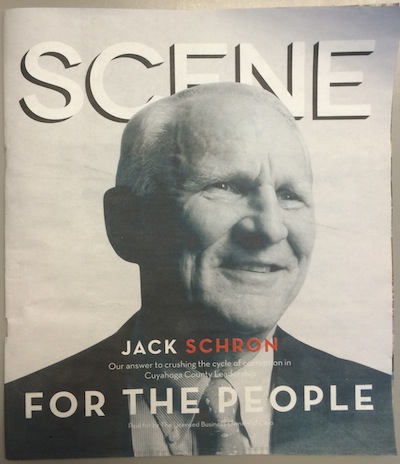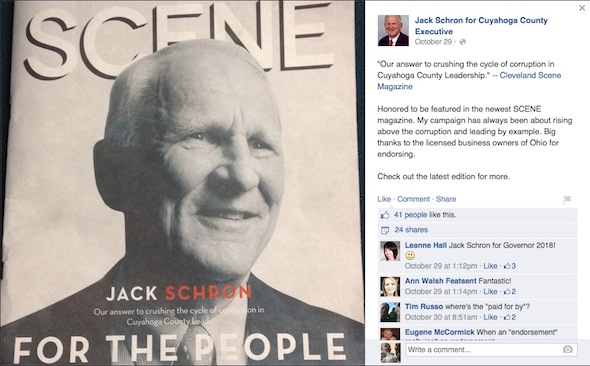DETROIT, MI — This is the image on the front of the latest issue of Scene, the alt-weekly in Cleveland:

The gentleman in the studied black-and-white portrait beneath the publication’s name is Jack Schron, the Republican nominee for Cuyahoga County executive. The caption reads: “Our answer to crushing the cycle of corruption in Cuyahoga County Leadership.” And then, in large print: “For the people.”
At a glance, it looks like another endorsement for Schron, who has been backed by The Plain Dealer and a local Latino publication. As The Cleveland Leader, a local news site, has detailed, the candidate has shared the image on Twitter and Facebook, thanking Scene for the “great article” and “great piece,” and even attributing that bold “crushing-the-cycle-of-corruption” line to “Cleveland Scene Magazine”:

But the picture wasn’t a cover tease to an endorsement, and Scene didn’t write that line. In fact, the publication doesn’t endorse candidates at all. This is an ad, paid for by a political action committee—part of a four-page wrap that encircled the front and back covers. (The real cover, it turns out, was not a county election, but a preview of LeBron James’ return to the Cleveland Cavaliers.)
The requisite credit line is down at the bottom of the image, and on each of the other pages: “Paid for by The Licensed Business Owners of Ohio.” The social media posts all do make some mention of the PAC, even where the disclosure line is cropped out. But the ad design, text, and use of the image on social media sure look as if the Schron campaign and its backers don’t mind if people get the wrong idea.
“It was disingenuous for the Schron campaign to claim it was anything but an advertisement,” Scene editor Vince Grzegorek said in reply to questions from CJR. He’s right. (The Schron campaign referred me to Doug Magill, a spokesman for the Cuyahoga County Republican Party, who said, “though the social media posts were enthusiastic, they did not cross the line.”)
Of course, the campaign only had the opportunity for social media shenanigans because Scene had allowed a PAC to buy a wrap ad that could be mistaken for an editorial endorsement in the first place. Schron’s supporters may have been inspired by another case last year, under Scene’s previous owners, when mayoral candidate Ken Lanci purchased a similar wrap ad, as Cleveland Magazine reported at the time.
The good news is that Scene is now reviewing its approach. “We’ll obviously talk internally to see how best to use or not use cover wraps in the future,” Grzegorek said.
Andrew Zelman, co-owner of Euclid Media, the alt-weekly’s parent company, did not seem especially upset about the campaign’s use of the ad on social media. Schron “has like 300 Twitter followers,” Zelman said. “I just don’t think people paid much attention to it.” (We wrote about Euclid and one of it’s other alt-weeklies, Detroit’s Metro Times, when another cover-story incident came up.)
But, like Grzegorek, Zelman said the publication would reconsider its policy. “I don’t see it as an issue if it’s for something like beer fest or the [county] fair”—other recent buyers of the wrap ad—“but with political candidates, when it looks like we’re endorsing a candidate and that’s not true, we might need to go back to our policy and see if maybe we shouldn’t be using the wrap for political candidates.”
Print ad revenue is not easy to turn away these days, of course. But at minimum, some standards are needed here: The wrap ads should be designed with a clear indication, at the top of the page, that they are ads. The ad’s design should not be easily confused as editorial, especially when its content is political, and the publication’s leadership should be ready to push back, including in print, when an ad is misleadingly represented.
And if, after the review, Scene decides that it can get by with fewer wrap ads—and keep its editorial content front and center—so much the better.
As Zelman put it: “I don’t want there to be that question of, if we are bought by a candidate to endorse them.”


 Archives:
Archives: